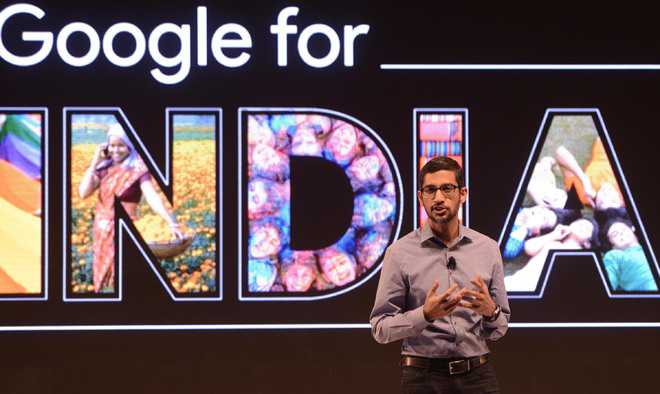
Google CEO Sundar Pichai at a news conference in New Delhi on Wednesday. A Tribune photograph
Tribune News Service & PTI
New Delhi, December 16
Expressing hope that India may become a bigger market for Google than the US sometime by the middle of 2016, its CEO Sundar Pichai, on his maiden visit to India after taking over as the CEO, said his company would soon launch Project Loon here in a bid to reach out to over two million small businesses and connect the countryside.
Talking to mediapersons here, Pichai said, “Project Loon will launch balloons in the sky to help reach out to the rural areas”.
Google Loon will essentially derive its advantage from these balloons, which will be like floating towers and naturally work more effectively in less densely populated areas in villages.
Google will invest more in India, step up hiring, build a new campus and provide affordable Internet access to millions in a nation that is US-based firm’s most important untapped market for adding users.
Describing India as among its most important market, Pichai said Google will set up a new campus in Hyderabad and invest both in engineering and business development in India and work to increase internet access and develop products that are lighter and faster.
“We will build new campus, ramp up engineering presence in Hyderabad to make products for India; and increase hiring in Bengaluru,” he said.
Pichai added that the company will power 100 railway stations across the country with WiFi by December 2016 as part of its partnership with RailTel.
The telecom wing of the Indian Railway, RailTel, had signed an agreement with the subsidiary of Google India to provide WiFi facilities at 400 stations across the country.
During his two-day visit Pichai will meet President Pranab Mukherjee and Prime Minister Narendra Modi to outline the ways Google is trying to connect those coming online for the first time in the country of more than 1.2 billion people.
He met Finance Minister Arun Jaitley and IT & Telecom Minister Ravi Shankar Prasad today and is scheduled to meet Modi tomorrow.
Google, which is the dominant search engine across major markets, said India ranks second, after the US, in terms of search volumes from mobile phones.
Pichai also said Google was working on a special project that would help women in rural India learn how to use the internet.
“It is extremely important to help women understand internet in the rural areas. We are doing it with internet Saathi. We are giving women volunteers cycles that would help them reach remote areas and teach women internet. This is being done across 1,000 villages,” Pichai said.
Google plans to reach 300,000 villages, or about 50% of the total villages in India.
He added that it was not just with regard to the use of Android-based phone devices that India would scale ahead of the US but there were many areas of technological development where India will become its first market for experimentation and trial before launch in other markets of the world.
“We developed the offline version of YouTube in India, tried it here and are now taking that to other countries,” Pichai said adding that it was an emotional experience for him to come to India and launch these initiatives in this country.
Pichai, an alumnus of IIT Kharagpur who joined Google in April 2004, reiterated that innovation would continue to be the platform on which Google would work with making payments more effective now was a big focus area.
On net neutrality, he said the principle was hugely critical for growth and innovation and Google endorsed it since it underlined the core internet principles of a free and open environment.



























